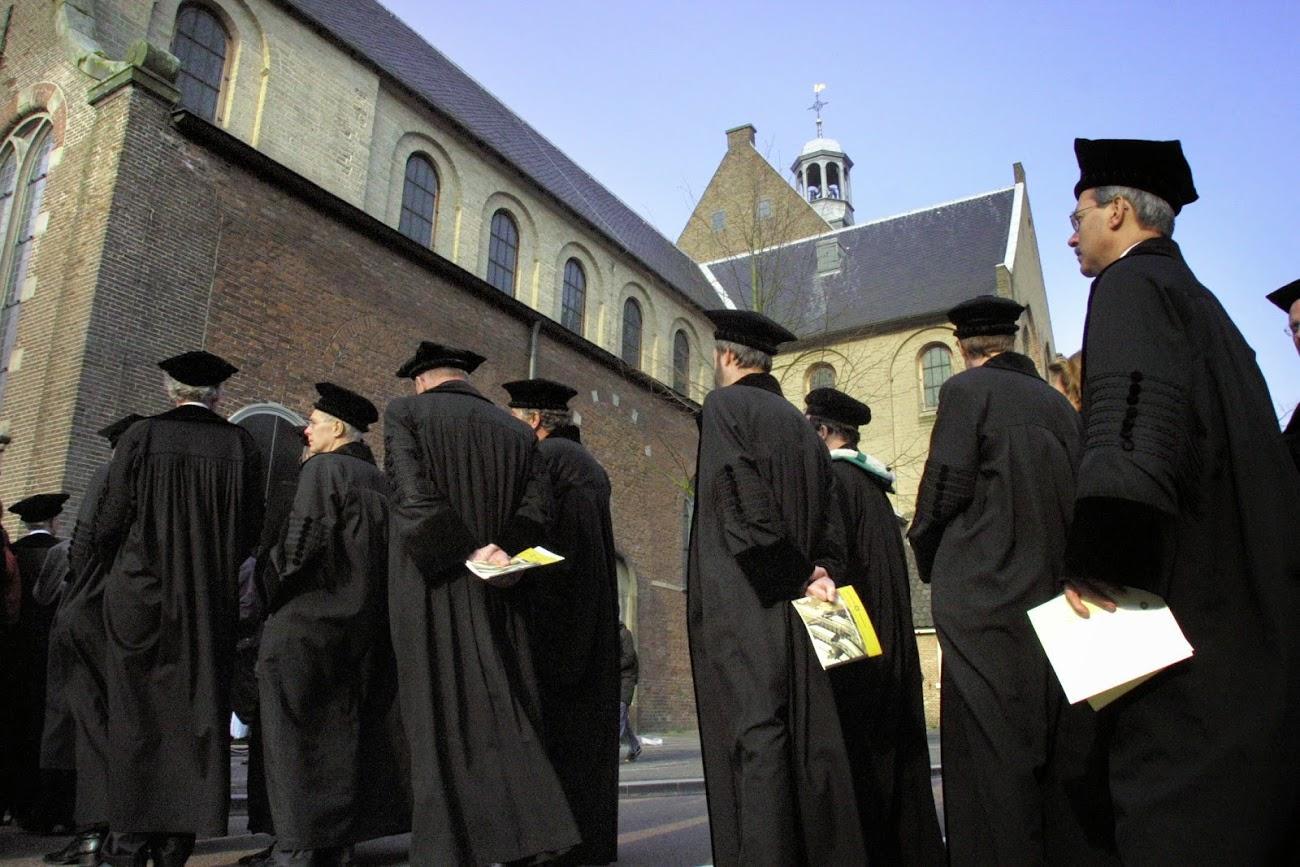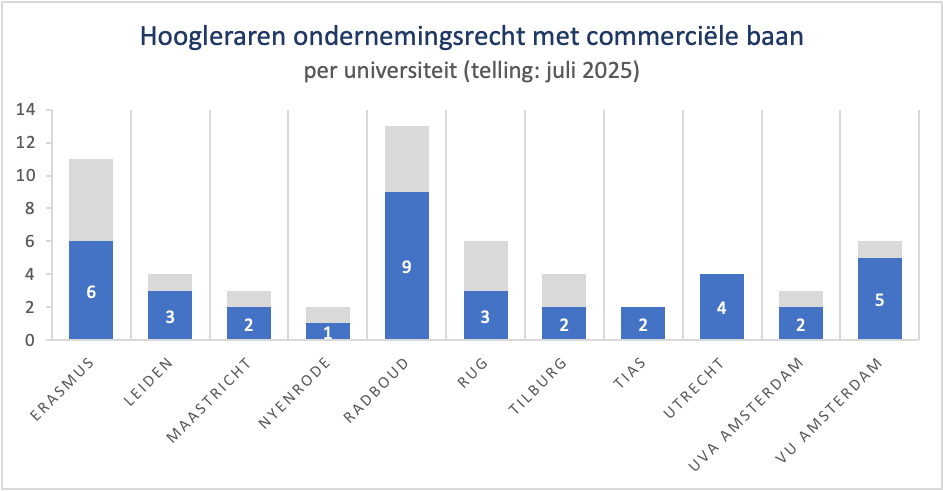It is the case of four UU professors
Commercial side job commonplace for corporate law professors

Last April, it emerged that professors of tax law often wear two hats in the Netherlands. Half of them had a commercial side job, mostly at one of the consultancy firms located in Amsterdam's Zuidas business district.
However, professors specialising in financial and corporate law are even more likely to have a side job, according to a new survey by Leiden University. In this field, 67 per cent of professors have side jobs. If one includes public side jobs, such as in the judiciary or public administration, the percentage rises to 75.
Unhealthy
‘With so many side jobs, the field is dominated by people who also have a commercial interest,’ says Leiden researcher Jan Vleggeert, himself a professor of tax law. ‘Consciously or unconsciously, the interests of companies or clients can influence what should actually be independent science. It does not sound healthy to me to have so many side jobs in a single field.’
Two professors of corporate law, who have side jobs and agreed to discuss the study anonymously, say that they are perfectly capable of separating their roles and the various interests involved. ‘If I feel that I am not free to address a certain topic, I simply don't take it on.’
Anne Lafarre, Professor of Corporate Law in Tilburg, is one of the few professors in her field without a side job. Nevertheless, she sees no problem with her colleagues' additional positions. ‘This is a fairly practical field, so students learn a lot from their practical knowledge. Myself included.’
Corporate law
Vleggeert counted the additional positions held by 57 professors. This group of academics specialises in the rules of banking, entrepreneurship and supervision. The legal aspects of mergers, international money flows and money laundering also fall within their field of research.
Of the 57 professors, 38 have a commercial side job at companies such as Stibbe, Loyens & Loeff, De Brauw Blackstone Westbroek, Baker McKenzie and Clifford Chance. Schiphol, Rabobank and Philips also pay the professors for their services, as do several law firms specialising in financial markets.

The number of corporate law professors with side jobs per Dutch university. Source: HOP
Lack of transparency
Not all professors are completely transparent about their secondary activities, Vleggeert observes. Four of the 57 professors do not mention their secondary activities on their university website. According to their code of conduct, academics are required to disclose secondary positions to prevent any potential conflicts of interest.
Two of these four professors say that their secondary employment was previously listed, but is no longer listed due to an administrative error. A third professor states that he reported his secondary position years ago, but did not verify whether it was included in the registry of secondary positions.
Concerns about influence
In August, the Rathenau Institute concluded that a growing group of citizens are concerned about the influence of financiers on scientific research. This also applies to senators and members of the House of Representatives, who have already asked the Minister of Education, Culture and Science a few times whether there should be a limit to the number of side jobs professors can have. The then minister of education, Eppo Bruins, did not think so. In his view, universities themselves must ensure a ‘healthy balance’.
Elections
Several parties have included measures in their election manifestos to combat what VVD calls 'covert influence' on academia. The centre-right party wants research funders to be made public. The Socialist Party proposes setting up an independent fund through which companies can contribute to research 'without having a say in the implementation or outcome of the research'.
The Party for the Animals wants universities to improve their registration of secondary activities. NSC explicitly mentions professors with jobs at tax consultancy firms. The party wants ‘clear boundaries to prevent conflicts of interest’.
Firms sell knowledge
It appears that the number of commercial side jobs in tax law and corporate law is higher than in other fields. Researcher Jan Vleggeert estimates that the national percentage is around 30 per cent. According to the association of Dutch universities, UNL, around 70 per cent of professors have a full-time appointment at a university, which means that a maximum of 30 per cent work part-time and may have a side job, Vleggeert reasons. It is only an indication, he says in response, but better figures are simply not available.
In any case, corporate law is significantly higher at 75 per cent (including public positions). Does this lead to problems with independence? Professor Lafarre from Tilburg, who has no additional positions, believes that her colleagues handle any client interests appropriately. For example, they leave the meeting if there is a risk of a conflict of interest, she explains.
Career
During the conversation, she mentions that in some cases, PhD graduates with a job at a firm are more likely to become professors at a university. ‘But that is often justified, precisely because of their practical and in-depth knowledge and their participation in the debate.’
Lafarre also mentions the budget cuts hitting education and research. Companies regularly sponsor chairs, and if independent appointment procedures are used and everyone is transparent about the sponsorship, Lafarre thinks that's great. ‘By making a chair available, these people from the field can contribute a lot to the academic world.’
Incidentally, this has a major advantage not only for universities, but also for the sponsoring firms, explains a professor with a side job who prefers to remain anonymous to avoid any hassle at the office or the university. ‘Law firms sell knowledge. We sell what we are good at. A professor is good at that like no other.’
Associate prof hier. Ik werk ook samen met industrie en dat zie ik niet als probleem, maar alle inkomsten gaan wel naar de vakgroep. Dat is zuiverder. Ik zou dit graag verplicht zien voor de hele universiteit.